Related Research Articles
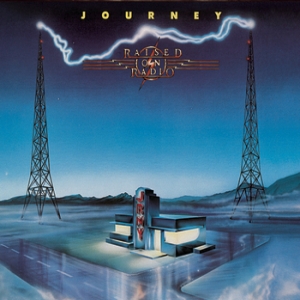
Raised on Radio is the ninth studio album by the American rock band Journey, released in April 1986 on the Columbia Records label. It is the first album to not feature founding bassist Ross Valory, who is replaced by session bassists Randy Jackson and Bob Glaub. Drummer Steve Smith contributed to a few tracks, but was subsequently replaced by Larrie Londin and Mike Baird.

"I Second That Emotion" is a 1967 song written by Smokey Robinson and Al Cleveland. First charting as a hit for Smokey Robinson and the Miracles on the Tamla/Motown label in 1967, "I Second That Emotion" was later a hit single for the group duet Diana Ross & the Supremes and The Temptations, also on the Motown label.

"Carry On Wayward Son" is a song by American rock band Kansas, released from the band's fourth studio album Leftoverture (1976). Written by guitarist Kerry Livgren, the song became the band's first Top 40 single, reaching No. 11 on the US Billboard Hot 100 in early 1977.

"I've Been Loving You Too Long" (originally "I've Been Loving You Too Long (To Stop Now)") is a soul music ballad written by Otis Redding and Jerry Butler. Considered by music critics and writers to be one of Redding's finest performances and a soul classic, it is a slow, emotional piece with Redding's pleading vocals backed by producer Steve Cropper's arpeggiated guitar parts and a horn section.
"Walk of Life" is a song by the British rock band Dire Straits, the third track on their fifth studio album Brothers in Arms (1985). It subsequently appeared on their live album On the Night (1993). It was released as a single October 1985 but had first been available as the B-side of "So Far Away" released in advance of Brothers in Arms.
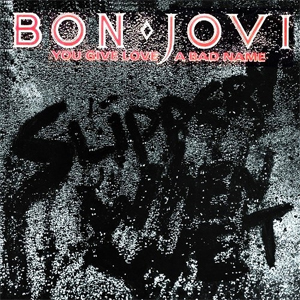
"You Give Love a Bad Name" is a song by American rock band Bon Jovi, released as the first single from their 1986 album Slippery When Wet. Written by Jon Bon Jovi, Richie Sambora, and Desmond Child about a woman who has jilted her lover, the song reached No. 1 on the U.S. Billboard Hot 100 on November 29, 1986, and became the band's first number one hit. In 2007, the song reentered the charts at No. 29 after Blake Lewis performed it on American Idol.

"Peg" is a song by the American rock group Steely Dan, first released on the band's 1977 album Aja. The track was released as a single in 1977 and reached number 11 on the US Billboard chart in 1978 and number eight on the Cash Box chart. With a chart run of 19 weeks, "Peg" is tied with "Rikki Don't Lose That Number" and "Hey Nineteen" for being Steely Dan's longest-running chart hit. In Canada, "Peg" spent three weeks at number seven during March 1978.
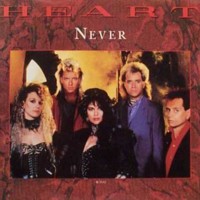
"Never" is a song by American rock band Heart, released as the second single from the band's eponymous eighth studio album (1985). It was written by Holly Knight, Gene Bloch and "Connie".

"Glory of Love" is a 1986 song performed by Peter Cetera, which he wrote and composed with his then-wife Diane Nini and David Foster. The song was recorded by Cetera shortly after he left the band Chicago to pursue a solo career. Featured in the film The Karate Kid Part II (1986), it was Cetera's first hit single after he left the band, reaching number one on the Billboard Hot 100, and it was included on his album Solitude/Solitaire (1986), which Michael Omartian produced.

"Press" is a song by the English rock musician Paul McCartney. It was released as the lead single from his sixth studio solo album, Press to Play (1986), being McCartney's 37th single. The single has "It's Not True" as its B-side, which was only included on CD releases of Press to Play.

"The Flame" is a power ballad written by British songwriters Bob Mitchell and Nick Graham. The song was released in 1988 by the American rock band Cheap Trick and the first single from their tenth album Lap of Luxury.
"I'll Be Over You" is a hit single by the American rock band Toto. Released as the lead single from their 1986 album, Fahrenheit, the song reached number 11 on the Billboard Hot 100 chart in 1986. Lead vocals were sung by guitarist Steve Lukather, who co-wrote the song with hit songwriter Randy Goodrum. Guest musician Michael McDonald provided the vocal counterpoint on the recording.
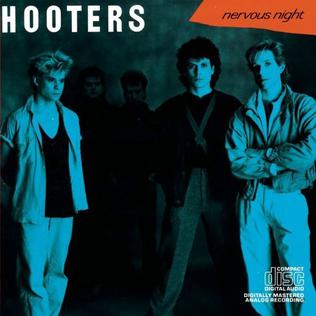
Nervous Night is the second studio album by American rock band the Hooters, released in May 1985 by Columbia Records and on CBS Records in Europe. The album features two of the band's biggest and best-known hits, "And We Danced" and "Day by Day", as well as the minor hit, "All You Zombies", which was a rerecorded version of a single that had first been released in 1982.

"Don't Get Me Wrong" is a song released by British-American alternative rock group The Pretenders. It was the first single taken from the group's 1986 album, Get Close. It can also be found on the band's The Singles album, released in 1987. Chrissie Hynde said she was inspired to write the song for her friend John McEnroe.

"Sleeping Bag" is a song performed by the band ZZ Top from their 1985 album Afterburner.

"Say You Will" is a song by British-American rock band Foreigner. It was the first single released from the album Inside Information (1987), and was co-written by Lou Gramm and Mick Jones.
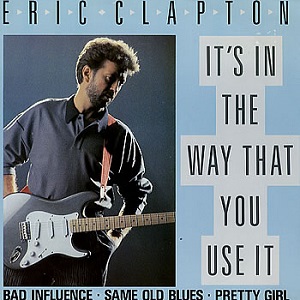
"It's in the Way That You Use It" is a song which was written by the English rock musician Eric Clapton in collaboration with The Band's guitarist and composer Robbie Robertson. The song was recorded and performed by Eric Clapton, who released the track under licence of Warner Bros. Records as the second of four singles from his 1986 studio album August in March 1987. The song, which is used as the theme tune to the Martin Scorsese film The Color of Money, was produced by Eric Clapton himself with the help of Tom Dowd, who acted as the assistant producer. The release sold more than 500,000 copies worldwide.

"Always and Forever" is an R&B song written by Rod Temperton and produced by Barry Blue. It was first recorded by the British-based multinational funk-disco band Heatwave in 1976. Released as a single on December 3, 1977, the song is included on Heatwave's debut album Too Hot to Handle (1976) and has been covered by numerous artists, becoming something of a standard.

"You Can Go Home" is a song by the American country rock band The Desert Rose Band, which was released in 1991 as the lead single from their fourth studio album True Love. It was written by Chris Hillman and Jack Tempchin, and produced by Tony Brown.
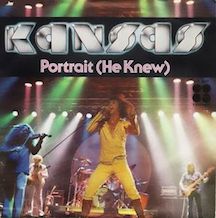
"Portrait (He Knew)" is a song by the American progressive rock band Kansas. It was written by Kerry Livgren and Steve Walsh and was recorded for the band's fifth album, Point of Know Return. The song was also released as a single after the success of "Point of Know Return" and "Dust in the Wind" and charted at #64 on the Billboard Hot 100. It was later released on the live and compilation albums Two for the Show, Live at the Whisky, Device, Voice, Drum, The Kansas Boxed Set, The Ultimate Kansas, Sail On: The 30th Anniversary Collection, Works in Progress, and Playlist: The Very Best of Kansas. It appears in a number of different mixes and lengths: the original album version, the edited single version, a different single edit that appears as a bonus track on the European-only 1999 compilation Definitive Collection, and a new remix by the original producers Jeff Glixman as a bonus track on the CD remaster of its original parent album. It was also released on the DVDs of Device, Voice, Drum and Works in Progress.
References
- ↑ "Kansas singles".
- ↑ "discogs.com". discogs.com. Retrieved May 4, 2021.
- 1 2 Kansas Billboard chart history, Billboard.com. Retrieved December 13, 2011.
- ↑ "Reviews". Billboard. November 1, 1986. p. 71. Retrieved 2022-08-07.
- ↑ "Single Releases" (PDF). Cash Box. November 1, 1986. p. 9. Retrieved 2022-08-07.
- ↑ Whitburn, Joel (2002). Top Adult Contemporary: 1961-2001. Record Research. p. 133.